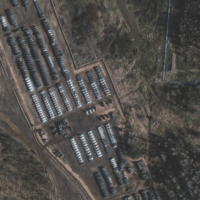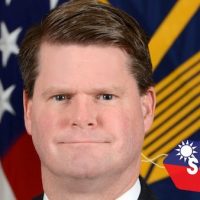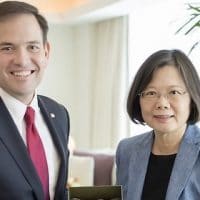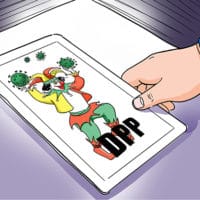-
U.S. invites authoritarian far-right regimes to ‘Summit for Democracy’
The Joe Biden administration invited numerous authoritarian far-right leaders to the U.S. State Department’s so-called “Summit for Democracy”, including Israel’s Benjamin Netanyahu, Poland’s Andrzej Duda, India’s Narendra Modi, Italy’s Giorgia Meloni, and Pakistan’s coup regime.
-
U.S. sends troops to Taiwan after general threatens war with China by 2025
The United States will quadruple the number of US forces stationed on Taiwan, which China claims as its own territory, in an effort to provoke a war with Beijing along the lines of the 2022 Russian invasion of Ukraine.
-
The United States wants to make Taiwan the Ukraine of the East: The Sixth Newsletter (2023)
On 2 February 2023, President Ferdinand Marcos Jr. of the Philippines met with U.S. Defence Secretary Lloyd Austin at Malacañang Palace in Manila, where they agreed to expand the U.S. military presence in the country.
-
“Chinese aggression” sure looks an awful lot like U.S. aggression
Punchbowl News reports that House Speaker Kevin McCarthy is planning a trip to Taiwan, which will be yet another incendiary provocation against Beijing if it occurs. The previous House Speaker, Nancy Pelosi, sparked a significant escalation in hostilities with her visit last year, the consequences of which are still reverberating today.
-
Taiwan local election shocks U.S. imperialism
Before the 2022 elections, Taiwan’s president, Tsai Ing-wen, had campaigned for her ruling “Democratic Progressive Party” (DPP) candidates with the assertion that Taiwan is an independent nation and should prepare to wage war.
-
Blinken falsely blames China for U.S. hostility directed at it
On Monday U.S. Secretary of State Tony Blinken made a curious remark: “China plans to seize Taiwan on ‘much faster timeline.”
-
Biden keeps pledging direct U.S. war with China over Taiwan
The president of the United States has once again committed the US military to direct hot war with China in the event of an attack on Taiwan, a commitment that was once again walked back by his White House handlers.
-
Imperialism and Taiwan
The recent visit of the speaker of the U.S. House of Representatives, Nancy Pelosi, to Taiwan has sharply increased the prospect of war in the region.
-
Nancy Pelosi, White Supremacy, and China
White supremacist arrogance was the order of the day when Nancy Pelosi ignored a red line set by the Chinese government and visited Taiwan. The Speaker of the House showed stereotypical and racist attitudes towards that country and began a chain of events that won’t go well for the U.S.
-
China issues statement on Nancy Pelosi’s visit to Taiwan
“The Taiwan question is purely an internal affair of China, and no other country is entitled to act as a judge on the Taiwan question,” the Chinese Foreign Affairs Ministry stressed.
-
China is issuing the same “Red Line” warnings about Taiwan that Russia issued about Ukraine
House Speaker Nancy Pelosi has continued to pour gasoline on the foreign policy dumpster fire that is her planned visit to Taiwan next month, now reportedly encouraging other members of congress to come along for the ride.
-
Biden’s reckless new provocation ratchets up risk of nuclear war with China
Sending U.S. Warships into South China Sea and Taiwan Strait in violation of UN Convention on the Law of the Sea
-
Sino-Russian collusion over Taiwan, Ukraine seems improbable but isn’t
U.S. has whipped up war hysteria over satellite image of Russian military camp in Yelnya, over 500 kms from Ukraine border, to allege Moscow’s invasion plans and to justify NATO involvement.
-
Pentagon whistleblower under investigation after warning about risks of war with China over Taiwan
Pentagon whistleblower Franz Gayl has been part of the United States Marine Corps for over four decades. He spent the last months trying to warn U.S. government officials and the public of the threat of becoming entangled in a war with China over Taiwan.
-
Tanks and think tanks: How Taiwanese cash is funding the push to war with China
Twenty years ago, a group of neoconservative think tanks used their power to push for disastrous wars in the Middle East. Now, a new set of think tanks staffed with many of the same experts and funded by Taiwanese money is working hard to convince Americans that there is a new existential threat: China.
-
How a key Pentagon official turned China policy over to arms industry and Taiwan supporters
Branded “Fortress Taiwan” by the Pentagon, the ambitious arms deal was the engineered by Randall Schriver, a veteran pro-Taiwan activist and anti-China hardliner whose think tank had been financed by America’s biggest arms contractors and by the Taiwan government itself.
-
With U.S. support, Taiwan planted deception about warning World Health Org of COVID
Taiwan’s claim that it provided early warning to the WHO about COVID and “human-to human-transmission” has been exploited by the Trump administration to attack the multi-lateral body and turn up the heat on China. There’s just one problem: it’s totally false.
-
Taiwan and WHO in the COVID-19 pandemic
The ruling establishment’s intrigue against the WHO might seem at odds with Taiwan’s failed bid to join the World Health Assembly (WHA) this past May, but there was no contradiction between Taiwan being seen fighting a David and Goliath-like battle with both the WHO and China, thereby flaring up geopolitical tensions from without. Both served the interests of the ruling class of Taiwan.
-
Could COVID-19 bring down the U.S. empire?
With the U.S. failing and China taking a leadership role in the international response to this crisis, could the COVID-19 crisis mark a turning point in the transition to a multipolar world in which China will be just as important as a world leader as the United States?
-
U.S. imperialist domination in Latin America and Europe
The history of empires amply demonstrates that in their phase of decline they become more violent and bloodthirsty, and that their leaders tend to be coarser and more brutal. Not only their leaders, as Donald Trump clearly demonstrates. Also its environment of advisors reflects similar devolution, becoming something similar to what Harold Laski, referring to the leaders of European fascism, called “outlaw elites”.






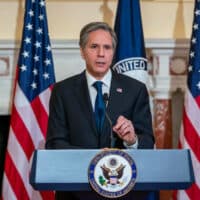
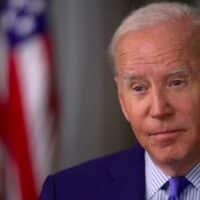
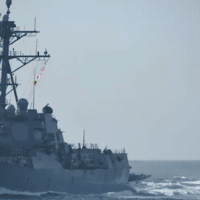
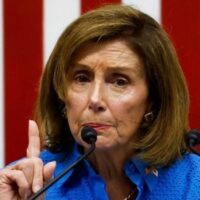
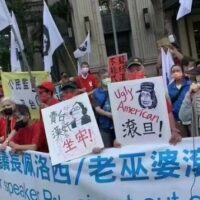
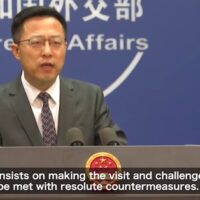
![Biden laughing in 2021. [Source: ia.acs.org]](https://mronline.org/wp-content/uploads/2022/07/Screen-Shot-2022-07-08-at-5.01.22-PM-200x200.png)
